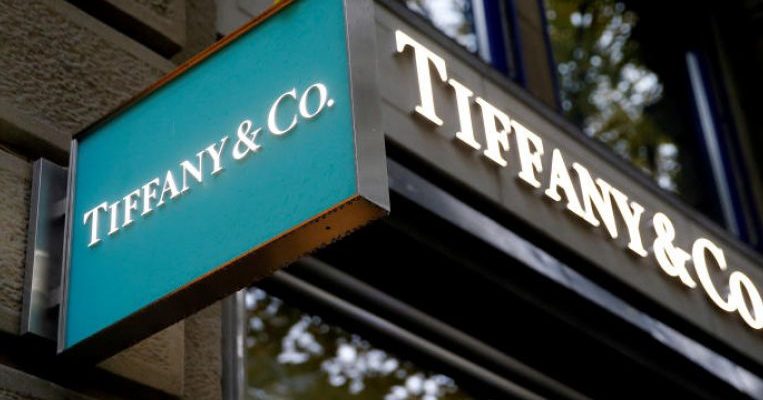
PARIS (BLOOMBERG) – LVMH has offered US$14.5 billion (S$19.8 billion) for jeweller Tiffany & Co in a bid that could result in chairman Bernard Arnault’s biggest-ever takeover and expand the Louis Vuitton owner’s reach into the US.
Tiffany said it received an unsolicited US$120-a-share proposal from the luxury giant, after the French company confirmed a Bloomberg report that . Tiffany shares surged 31 per cent, on track for a record one-day gain, to US$129 at 2:55pm on Monday in New York.
The jeweller advised shareholders to take no action, saying its board is reviewing the offer. LVMH made the initial offer on Oct 15, when it represented about a 33 per cent premium to the previous day’s close, people with knowledge of the matter said.
There’s no assurance that preliminary talks will result in an agreement, LVMH said in a statement, while Tiffany said no discussions are under way.
A deal for the jeweller would expand the French company’s access to US luxury shoppers, giving it an iconic, 182-year-old brand known for its robin’s egg blue boxes and its role as a favorite haunt of Holly Golightly in Truman Capote’s Breakfast At Tiffany’s. Adding the brand to a stable that includes the Bulgari jewel and watch label, Christian Dior fashions, Hublot watches and Dom Perignon Champagne could help LVMH compete against Cartier owner Richemont.
Jewellery is one of the few segments of the luxury sector where LVMH is not the leader, “and we know Mr Arnault likes to be always No. 1”, RBC analyst Rogerio Fujimori said in a note. “Tiffany would become a better company and stronger competitor under the ownership of LVMH.”
Even after Monday’s surge, Tiffany shares are short of their peak of US$139.50 in July 2018.
A fair valuation of the jeweller would be about US$160 a share or higher, according to Cowen & Co analyst Oliver Chen. He wrote in a note on Sunday that Tiffany’s “strategic positioning as a gifting authority, brand DNA as a diamond and bridal authority, are leading qualities and deserve an exceptional premium”.
LVMH fell 0.5 per cent in Paris trading on Monday. It has jumped about 48 per cent this year, giving the company a market capitalisation of about US$214 billion.
The French company has been riding a wave of luxury demand in China but faces risks including that country’s trade war with the US and the months-long anti-Beijing protests in Hong Kong. Earlier this month, it opened a new Louis Vuitton factory in Texas in a ceremony that included US President Donald Trump as the French company sharpens its focus on the US, its second-largest region by revenue behind Asia.
A takeover of Tiffany would be bigger than the US$7 billion LVMH paid for the rest of Christian Dior in 2017. For 70-year-old Mr Arnault, it would be his first major transaction since the purchase of luxury hotel chain Belmond last year, and potentially among the largest deals by a European company in 2019.
After a difficult period when it lost track of consumer trends and suffered from a slump in US tourism, Tiffany has been bouncing back under chief executive officer Alessandro Bogliolo, revamping its New York flagship store with major investments targeting younger shoppers.
Mr Bogliolo, a former executive of Bulgari and jeans label Diesel who was hired by the US jeweller two years ago after hedge fund Jana Partners pushed for changes, has refreshed Tiffany’s marketing. The CEO said last month that he plans to open more stores in mainland China as a weak yuan deters the country’s consumers from spending overseas.
In jewellery, LVMH isn’t as dominant as in fashion. Adding Tiffany would expand the French giant’s potential market with somewhat more accessible products. Unlike Bulgari’s more-rarefied offerings, such as €2 million (S$3 million) wristwatches, Tiffany is better known for engagement rings that might cost a couple months’ pay.
Mr Arnault is already Europe’s richest man, with a fortune of US$96.5 billion, according to Bloomberg Billionaires Index. A deal for Tiffany would keep him ahead of Richemont’s Johann Rupert and Gucci owner Kering’s Pinault family in the race to consolidate the luxury industry. With sales of more than US$50 billion, LVMH dwarfs Tiffany, which has about US$4.4 billion.
If an agreement is reached, it would mark the latest push by a French acquirer to tap growth in the US. French technology company Dassault Systemes agreed in June to buy Medidata Solutions, a software firm that analyses clinical trials, for US$5.7 billion. And last year, AXA acquired XL Group for US$15.3 billion, seeking to capture a bigger slice of the US property and casualty market.
